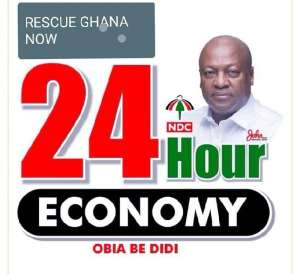
Kwaku Bimpeh, the Director of Communications for NPP UK, recently penned a scathing article titled "Pathetic, Backward, and Simply Chaotic: The NDC’s Stance on a 24-Hour Economy," aiming to discredit the National Democratic Congress's (NDC) policy. While attempting to undermine the NDC's stance, Bimpeh's rhetoric reveals a biased perspective and a lack of substantive critique. Furthermore, amidst the criticism, it's essential to recognise the positive impact of John Dramani Mahama's 24-hour economy policy, particularly concerning job creation across Ghana.
Bimpeh's article relies heavily on inflammatory language, using terms like "pathetic" and "backwards," which only serve to detract from meaningful discourse. Resorting to such ad hominem attacks reflects poorly on the professionalism of NPP UK's communication strategy and undermines the credibility of Bimpeh's argument.
Moreover, Bimpeh's characterisation of the NDC's proposal as "chaotic" lacks substantial evidence or analysis. A comprehensive critique of the economic feasibility, potential challenges, and comparative advantages of implementing a 24-hour economy would have been more constructive. However, Bimpeh's rhetoric appears more focused on discrediting the opposing party than engaging in genuine dialogue.
In contrast, John Dramani Mahama's 24-hour economy policy presents several beneficial aspects, particularly regarding job creation across Ghana. By extending business operating hours, Mahama's policy aims to stimulate economic activity, increasing employment opportunities for Ghanaians.
One significant benefit of Mahama's policy is its potential to address underemployment and unemployment by providing opportunities for shift work and flexible scheduling. This approach can benefit various segments of the population, including youth and women, who often face challenges in accessing formal employment opportunities.
Furthermore, embracing a 24-hour economy aligns with global trends and the evolving nature of work in the digital age. By leveraging technological advancements and adapting to changing consumer behaviours, Ghana can position itself as a dynamic and progressive economy capable of attracting investment and creating sustainable jobs.
Mahama's policy also emphasises investing in infrastructure and skills development to support the transition to a 24-hour economy. By modernising infrastructure and providing training programs, Ghana can equip its workforce with the necessary tools and capabilities to thrive in a continuously evolving economic landscape.
In conclusion, while Kwaku Bimpeh's article attempts to discredit the NDC's proposal for a 24-hour economy, it falls short of providing a substantive critique. Instead, it reflects a biased perspective and a lack of genuine engagement with the policy proposal. Conversely, John Dramani Mahama's 24-hour economy policy offers promising opportunities for job creation across Ghana, highlighting the importance of embracing innovative strategies to drive economic growth and prosperity. Moving forward, a more balanced and evidence-based approach to political discourse is essential to foster constructive dialogue and address Ghana's complex socio-economic challenges.
Owusu Achiaw
NDC UK/Ireland Chapter
Communication Officer
Fiifi Asante-Mparey
NDC UK/Ireland Chapter
Deputy Communication Officer.




 Court dismisses Serwaa Amihere case against Henry Fitz, two others
Court dismisses Serwaa Amihere case against Henry Fitz, two others
 Stolen BRVs: Bi-partisan parliamentary probe non-negotiable — Dr. Omane Boamah
Stolen BRVs: Bi-partisan parliamentary probe non-negotiable — Dr. Omane Boamah
 Bawumia begins regional campaign tour on Monday
Bawumia begins regional campaign tour on Monday
 With great urgency backed by verifiable data, facts and figures dismiss COCOBOD,...
With great urgency backed by verifiable data, facts and figures dismiss COCOBOD,...
 EC’s statement on obsolete BVDs discovery “lies, half-truths, pure fantasies” – ...
EC’s statement on obsolete BVDs discovery “lies, half-truths, pure fantasies” – ...
 Nalerigu court impound vehicles of DCE, Director of Chereponi district for owing...
Nalerigu court impound vehicles of DCE, Director of Chereponi district for owing...
 Cop, 7 others grabbed over $523,000 Gold Scam
Cop, 7 others grabbed over $523,000 Gold Scam
 Akufo-Addo’s driver wins Dadekotopon NPP Parliamentary Primary
Akufo-Addo’s driver wins Dadekotopon NPP Parliamentary Primary
 Investigate, jail persons liable for GRA-SML contract – Manasseh
Investigate, jail persons liable for GRA-SML contract – Manasseh
 Lawyer wins Akan NPP Parliamentary Candidate primary
Lawyer wins Akan NPP Parliamentary Candidate primary
